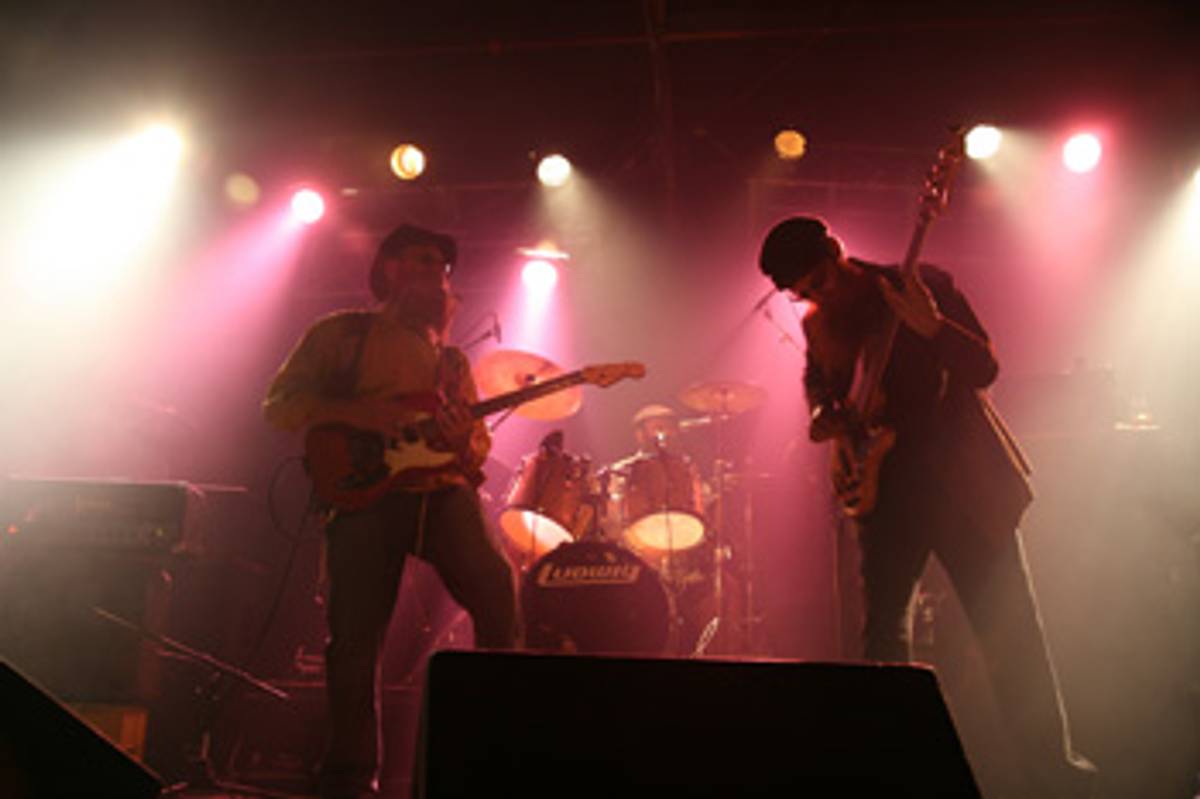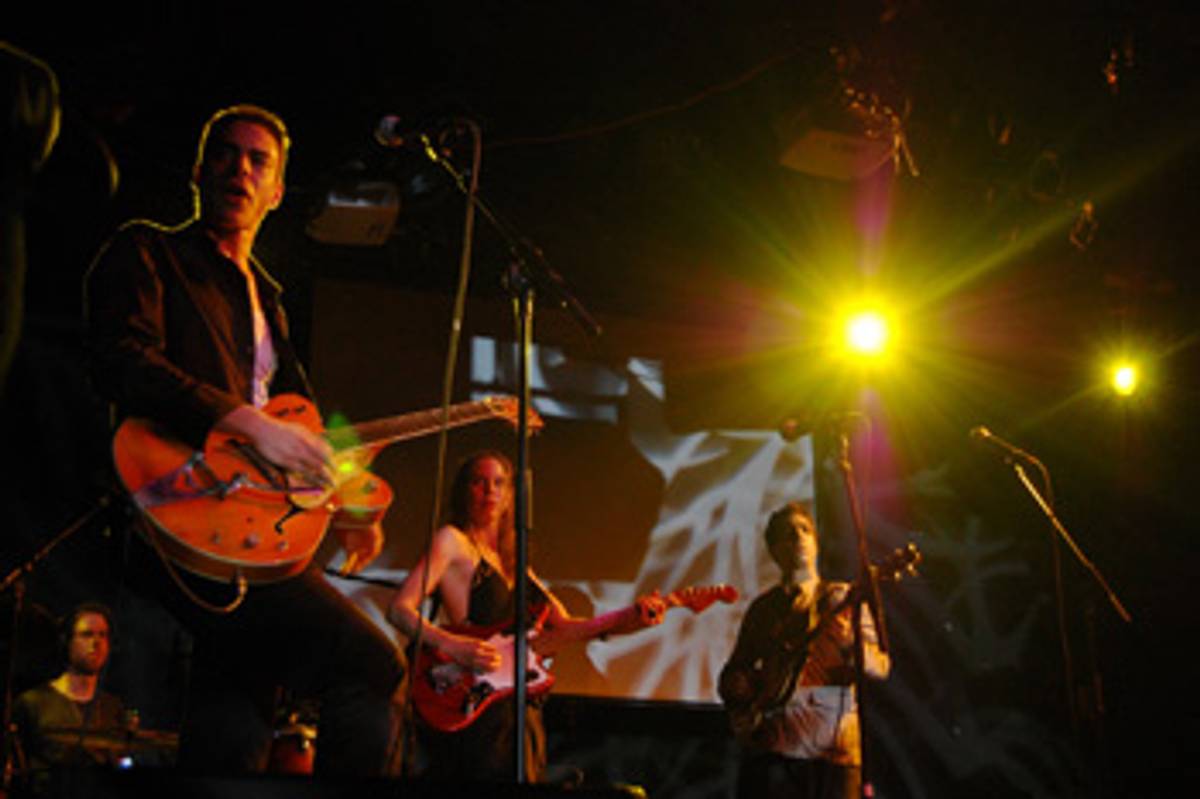There’s a strange phenomenon among people who become Orthodox—they seem to enter a time warp. Their clothes, their colloquialisms, even their musical choices become frozen in a single moment, like Rip Van Winkle or Doc Brown in Back to the Future. Every time they talk about bands or movies or commercial jingles, they’re back at the moment they stepped into their proverbial DeLorean.
Eliezer Blumen is one of those people. He’s been living as a Hasidic Jew for the past twenty years, and to the casual eye he’s a standard-issue Hasid: white shirt, bushy beard, well-worn hat. The trademark vest he wears (more Montana mountain man than Boro Park shtetl-fabulous) hints at something less ordinary, but it’s barely noticeable—lots of Hasidim have their dress quirks, a bright-colored scarf or the occasional pair of rainbow-striped socks.
On a recent trip to New York from his current home in Israel, Blumen stopped by to drop off Real People, the new album from his power rock trio, Yood. How can you tell that they’re a power rock trio? For starters, the phrase “Power Rock is on the CD cover, emblazoned on a dirty wall behind the band, even though it’s neither the band name nor the album title. If a band is going to call itself “punk”—much like someone wearing a shirt that says “porn star” in shiny letters—chances are, well, it isn’t. If you’re all about heavy crunching chords and big-beat drums, however, you’d sure as hell better say it loud and proud.

The album is bombastic, but it’s a clean, organized kind of bombast; the kind of rawk that one would associate with AC/DC, or even early Metallica”guys who could destroy indie rock kids with a single shake of their grease-sharpened hair (or, for that matter, their beards). Yood calls to mind an early episode of The Simpsons: driving through Brooklyn on a school trip, Bart spots some Hasidic Jews, pulls down the bus window, and yells, “ZZ Top! You guys rock! Upon hearing this, one Hasid turns to another and says, “Did you hear that? We rock! For a small minority of the world’s population—Hasidic Jews who love themselves some old-fashioned rock ’n roll (and still write it with an “n”)—there’ll always be Yood.
There are many good old-fashioned rock ‘n roll moments on Real People. From the blast-off quality of “Free”—in which the two-and-a-half minute guitar solo seems determined to break free of the song, climbing higher and higher along scales, while the song is determined to chase it—to the wailing, harmonica-backed country rock of “Straight to You,” you could sneak it onto the jukebox of a Chicago sports bar, circa 1985, and have an instant round of cigarette lighters in the air.
At times, it’s difficult to remember this is a religious album. And yet, there’s something religious—even fundamental—about it. Like the fact that the lyrical “you” probably refers to God rather than to a biker chick. Like the “ai-yai-yais” that sometimes sneak through the choruses. Or, indeed, the unabashed power rock vibe, which feels both intimate and anthemic, like someone locked in his imagination and playing to a hypothetical arena—something like, dare it be suggested, a religious experience. It’s almost enough to have you up on the couch, playing air guitar—or to take you back to the last moment before you were too religious to cast off your black fedora and do such a thing.
Listen to “Wastin’ Away” by Yood
Listen to “Free” by Yood
A few years ago, the diva and rapper M.I.A. fused dance music, Bollywood music, and hip-hop, and presented it to the world as the latest in music sampling. It wasn’t the first such fusion, but it might have been the first time it was so seamlessly executed.

Although Electro Morocco, a New York-based band of Israeli expatriates, isn’t pushing nearly as many musical boundaries as M.I.A. did, the comparison is inevitable and well-deserved. They draw from different parts of the world, but share an aesthetic, both technical and emotional, with M.I.A.
Both include Eastern belly-shaking samples—Indian in M.I.A.’s work, and Middle Eastern in Electro Morocco’s. But Electro Morocco works hard to establish a fresh sound, layered with organic guitars and synthetic beats, that is clearly their own. Their programmed drums are deceptively simple, but grow more intricate with repeated listenings. The off-beat rhythm, the interplay of tweaked, Oriental-sounding guitars, and the frenzied climaxes call to mind bellydancing music and hard rock. The half-sung, half-spoken choruses are catchy yet elusive; they’re eminently repeatable, but you quickly realize you’re singing syllables, not coherent words. Is it just an accent, or a mystical-sounding foreign language?
Mostly, though, you’ll just sit back and dig it. “Joe Pill” is a four-minute dance party, with whirring Arabic plucked guitars and a full-on club beat. “Monkey Do” starts with a trade-off between keyboard blasts characteristic of Middle Eastern dance music and a furious, distortion-heavy electric guitar. The melody of “Sachbak” is strikingly original, yet strangely reminiscent of a blues band, the kind in which an 80-year-old man plays guitar on a stool, making his fingers dance in seemingly superhuman patterns; it’s a plucked guitar line so complex that it sounds like a sample. In Electro Morocco’s short time together (less than a year) it’s almost suspect how tightly they play together. This Hanukkah, they’ll be co-headlining the Sephardic Music Festival in New York. And from there, it’s easy to imagine them taking over the rest of the country in a matter of weeks.
Listen to “Take Me Back” by Electro Morocco
Listen to “Joe Pill” by Electro Morocco
Fusion has become sort of a prerequisite for popular music these days. Perhaps it’s a side-effect of the Internet—if you can listen to every radio station in the world, you might as well be influenced by the best. But, as an expatriate American Hasidic guitarist playing American hard rock has found—and as a band of Israeli expatriates reaching for their Middle Eastern roots is learning—sometimes you have to leave home in order to appreciate where you’re from.
Matthue Roth is a performance poet and author of the novel Losers. He is an associate editor at MyJewishLearning.com.